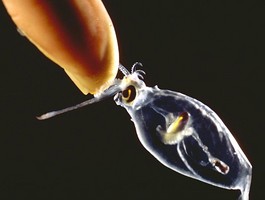Liocranchia
Richard E. Young and Katharina M. Mangold (1922-2003)


This tree diagram shows the relationships between several groups of organisms.
The root of the current tree connects the organisms featured in this tree to their containing group and the rest of the Tree of Life. The basal branching point in the tree represents the ancestor of the other groups in the tree. This ancestor diversified over time into several descendent subgroups, which are represented as internal nodes and terminal taxa to the right.

You can click on the root to travel down the Tree of Life all the way to the root of all Life, and you can click on the names of descendent subgroups to travel up the Tree of Life all the way to individual species.
For more information on ToL tree formatting, please see Interpreting the Tree or Classification. To learn more about phylogenetic trees, please visit our Phylogenetic Biology pages.
close boxIntroduction
These moderate-sized squids reach a maximum size of 250 mm (Nesis, 1982). They are cosmopolitan in tropical and subtropical waters although Young (1995) suggested that L. reinhardti was a mesopelagic boundary species (i.e., that it is associated with land masses). In Hawaiian waters L. reinhardti is a vertical migrator while L. valdiviae is a deep-living non-migrator (Young, 1978).
Brief diagnosis:
A cranchiin ...
- with two rows of diverging cartilagenous tubercules originating at each funnel-mantle fusion.
Characteristics


Figure. Young Liocranchia sp., off Hawaii, showing sessile eyes. Photograph by R.E. Young.
- Tentacles
- Suckers and pads in two series on distal 2/3 of tentacle stalk.
- Suckers and pads in two series on distal 2/3 of tentacle stalk.
- Head
- Eyes sessile in paralarvae.
- Eyes sessile in paralarvae.
- Funnel
- Funnel valve present.
- Funnel organ with very large ventral pads.
- Mantle
- Two pairs of diverging tuberculate cartilaginous strips on mantle; originate at each funnel-mantle fusion (see Title picture).
- Two pairs of diverging tuberculate cartilaginous strips on mantle; originate at each funnel-mantle fusion (see Title picture).
- Fins
- Fins unite posterior to gladius (nearly circular in combined outline) (see Title picture).
- Fins unite posterior to gladius (nearly circular in combined outline) (see Title picture).
- Photophores
- Number of oval photophores on each eye varies with species (4 or 14).
- Photophores on tips of arms III in mature or nearly mature females.
Comments
Characteristics are from Voss (1980).
Comparison of species
| Cartilagenous tubercules present along middorsal line of mantle. | Number of photophores on eyeball. | |
|---|---|---|
| L. reinhardti | Yes | 14 |
| L. valdiviae | No | 4 |
References
Voss, N. A. 1980. A generic revision of the Cranchiidae (Cephalopoda; Oegopsida). Bull. Mar. Sci. 30: 365-412.
Young, R. E. 1978. Vertical distribution and photosensitive vesicles of pelagic cephalopods from Hawaiian waters. Fish. Bull. 76: 583-615.
Young, R. E. 1995. Aspects of the natural history of pelagic cephalopods of the Hawaiian mesopelagic-boundary region. Pacific Science 49: 143-155.
About This Page
Drawings from Voss (1980) printed with the Permission of the Bulletin of Marine Science

University of Hawaii, Honolulu, HI, USA
Katharina M. Mangold (1922-2003)

Laboratoire Arago, Banyuls-Sur-Mer, France
Page copyright © 2016 and Katharina M. Mangold (1922-2003)
 Page: Tree of Life
Liocranchia .
Authored by
Richard E. Young and Katharina M. Mangold (1922-2003).
The TEXT of this page is licensed under the
Creative Commons Attribution-NonCommercial License - Version 3.0. Note that images and other media
featured on this page are each governed by their own license, and they may or may not be available
for reuse. Click on an image or a media link to access the media data window, which provides the
relevant licensing information. For the general terms and conditions of ToL material reuse and
redistribution, please see the Tree of Life Copyright
Policies.
Page: Tree of Life
Liocranchia .
Authored by
Richard E. Young and Katharina M. Mangold (1922-2003).
The TEXT of this page is licensed under the
Creative Commons Attribution-NonCommercial License - Version 3.0. Note that images and other media
featured on this page are each governed by their own license, and they may or may not be available
for reuse. Click on an image or a media link to access the media data window, which provides the
relevant licensing information. For the general terms and conditions of ToL material reuse and
redistribution, please see the Tree of Life Copyright
Policies.
Citing this page:
Young, Richard E. and Katharina M. Mangold (1922-2003). 1996. Liocranchia . Version 01 January 1996 (under construction). http://tolweb.org/Liocranchia/19543/1996.01.01 in The Tree of Life Web Project, http://tolweb.org/







 Go to quick links
Go to quick search
Go to navigation for this section of the ToL site
Go to detailed links for the ToL site
Go to quick links
Go to quick search
Go to navigation for this section of the ToL site
Go to detailed links for the ToL site